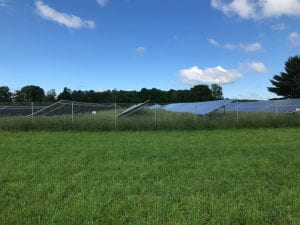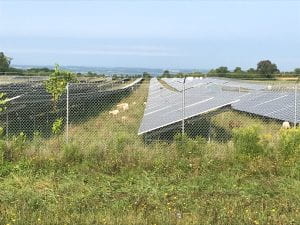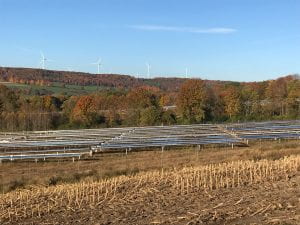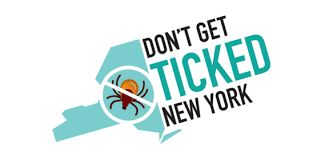Cornell Cooperative Extension of Herkimer County (CCE) is updating the Herkimer County Local Foods Map for 2025. All farms listed on the 2024 map will be contacted for updates. However if your farm was NOT on the 2024 map and you would like to be considered for the 2025 map, please call (315) 866-7920 or email herkimer@cornell.edu. All listings are free for producers thanks in part to the Herkimer County Farm Family Assistance Project. To be part of the map, you need to produce a local food product and your farm must be located in Herkimer County. The deadline to be listed on the map is Friday, February 21, 2025. See the 2024 map at http://bit.ly/CCEHerkCoLocalFoodsMap
NYSERDA’s Agriculture Energy Assistance
Learn more about NYSERDA’s Agricultural Energy Audit Program, REAP Technical Assistance Program, and Energy-Related Best Practices.
- Agriculture Energy Audit Program (AEAP): This program offers NY state farmers no-cost energy audits to help identify energy efficiency opportunities on their farm.
- REAP Technical Assistance Program (RTAP): This program has been designed to assist farmers at no-cost to make applications to the Rural Energy for America Program (REAP). If awarded, farmers can receive up to 50% of the total project cost.
- Energy Best Practices for Agriculture: The best practices have been developed to help educate producers with energy-efficient technologies, how they function, the average cost, and the average payback in years.
To learn more about these programs and eligibility, click here: Agriculture Energy Assistance – NYSERDA.
2025 Veggie Van Request for Proposals
Cornell Cooperative Extension Herkimer County (CCE) is seeking proposals from qualified farmers or farming organizations to operate a Veggie Van pilot program in collaboration with our organization. The Veggie Van program aims to increase access to fresh, locally grown produce and other agricultural products in underserved communities within Herkimer County. This initiative is part of our ongoing commitment to promoting healthy lifestyles, supporting local agriculture, and addressing food insecurity.
For more information, contact ccm73@cornell.edu
Food Insecurity Among Adults in Herkimer County
According to a January 3, 2024 article by the New York State Department of Health, State Health Department Releases Report On Food Insecurity Among Adults, Herkimer County has the highest percentage of adults who experience food insecurity (outside of New York City) at 28.8 percent.
According to the article, adults experiencing food insecurity have a higher probability of several chronic diseases, including hypertension, coronary heart disease, diabetes, stroke, cancer, asthma, arthritis, chronic obstructive pulmonary disease, and kidney disease.
The NY State Health Department administers several programs that support increasing food and nutrition security across the State:
The Hunger Prevention and Nutrition Assistance Program, The Special Supplemental Nutrition Program for Women, Infants and Children (WIC), and The Child and Adult Care Food Program.
Local resources for Herkimer County include:
- Cornell Cooperative Extension Nutrition Education
- Services and Program at Catholic Charities
- 211 MidYork
- Herkimer County Public Health
Perspectives on the Opportunities and Impacts of Solar Installation in Agricultural Areas
In a continued collaboration between Cornell Cooperative Extension, Pennsylvania, and Farm Bureaus of Ohio, Pennsylvania and New York this series of webinars will explore the continued push for development of solar energy projects in agricultural areas of the Northeast. This five part series will address the topic from multiple perspectives and help to identify the opportunities and challenges as well as currently known best practices for integrating the need for renewable energy with other economic and social factors.
Session #1 Video – Impacts of Large-Scale Solar on Rural Communities – A Research Perspective
Research into this topic is still relatively new; however, initial studies offer some insight into how the perceptions, impacts and opportunities around solar and land use. This session will explore current finding on key issues in rural communities, decision making metrics being developed through this research and how communities can integrate these metrics. Additionally, the potential tradeoffs between energy and agriculture and emerging opportunities in agrivoltaics will be discussed.
Local Law for Solar Project Development in Pennsylvania – Slides
Economic Impacts of Solar on Rural Communities – Slides
Session #2 Video – Solar and Agriculture – A Company’s Perspective on the Challenges and Pathways to Successful Integration of Both
Developers of large-scale solar facilities are interested in optimizing the use of the land within the project footprint and continue to work to understand the opportunities and challenges of agrivoltaics, or dual use, setups. The session will also explore the key aspects of the decision-making process developers use for site selection and how they weigh these factors against impacts on land use, particularly when the location contains soil types identified as prime for agriculture production.
Agrivoltaics – Slides
Solar and Agriculture – Slides
Moderator: Jeff Williams, NY Farm Bureau JWilliams@nyfb.org
Panelist:
- Marguerite Wells, Invenergy MWells@invenergyllc.com;
- Josh Bennett/Kevin Campbell, EDF Josh Bennett: Bennett@edf-re.com Kevin Campbell: Kevin.Campbell@edf-re.com
- Iain Ward, Solar Agricultural Services iain@solaragservices.com
Session #3 Video – A Farmer’s Perspective on Solar
Farmers who have looked closely at solar electricity production on their land will discuss their experiences with developers, and their perceptions of the benefits and challenges of solar for agriculture. Discussion will include differences in the scale of solar projects, how solar might impact farmers in varied circumstances, and ideas for optimizing the benefits of a nd mitigating the challenges of solar for agriculture.
A Community Perspective on Solar in New York State – Slides
Speakers:
- Alan Zepp – aczepp@gmail.com see Ag mentor program launches in Pennsylvania (farmprogress.com) and LinkedIn
- Klaas Martens – kandmhfarm@lakevieworganicgrain.com see Meet This Third-Generation Farmer Who Converted His 1,400 Acres to Growing Organic Food – EcoWatch
- Ray Dykeman – raymond.dykeman@gmail.com see New York Employers Are Eager to Hire Migrants. They Can’t. – The New York Times (nytimes.com)
Moderator: David Kay
Session #4 Video – A Community Perspective on Solar
Expanding out beyond the impacts to individual landowners, solar develop can have broader opportunities and challenges for the rural, agricultural based communities that host them. This session will offer observations and ideas for the community level on best practices for successfully integrating solar as a land use. When it is a competing land use and when it can be a complementary land use.
Speakers:
- Katie Malinowski is the Executive Director for the Tug Hill Commission, beginning her career there in 1998 as a natural resources specialist. She leads the state agency’s work with local governments and other partners in planning, natural resources, and community development. She received her MS in Environmental Science – Water Resources from the School of Public and Environmental Affairs, Indiana University, Bloomington, IN. Her undergraduate studies were completed at SUNY Binghamton with a BA in Environmental Studies.
- Matt Johnson is the Planning Director for the Tug Hill Commission and has over 25 years’ experience working with small rural communities in the Tug Hill region on a wide variety of planning and land use issues. Matt assists communities with comprehensive plans, zoning laws, subdivision laws, and GIS projects. He received his Bachelor’s Degree from Syracuse University in 1993 and a Master’s Degree from Boston Architectural College in 2018. He is a member of the American Institute of Certified Planners.
- Matthew Smith is a Planner at the NYS Tug Hill Commission using his technical knowledge to help local governments through the comprehensive plan, zoning code and subdivision law update processes. He has a Bachelor’s Degree in Political Science with a minor in History from Siena College. Matthew has completed an update to the “Planning for Offsite Solar” technical paper for the commission, has given a presentation on the progress and scale of solar buildout for local farmers interested in solar sheep grazing, and has recently completed a regional soils map intended to be a tool for local officials to protect their natural assets and better site incoming solar facilities.
Moderator: Lily Guthrie
Session #5 Video – Question and Answer
A Q&A to cover any and all of the previously presented material in Sessions 1-4 featuring the speakers from this series.
Mohawk Valley Energy Choices
New York State is embarking on a transition to an inclusive clean energy powered economy. All residents, businesses and communities across the State will have access to new opportunities to benefit from this transition including clean energy careers, home improvements, even rebates for businesses and personal transportation. But there’s a lot of information out there, and people may not know where to start.
To help New Yorkers access and navigate these opportunities, NYSERDA created the Regional Clean Energy Hubs. Clean Energy Hubs connect people to the clean energy economy.
The Mohawk Valley Regional Clean Energy Hub is your team of trusted, knowledgeable, community-based organizations from across the region and is a collaboration of Cornell Cooperative Extension of Oneida, Herkimer, Otsego, Fulton, Montgomery, and Schoharie County, in partnership with Mohawk Valley Economic Development District and Otsego County Conservation Association.
Cultivate Herkimer: Empowering Local Agriculture for a Sustainable Future
The Herkimer County Agricultural Council and Cornell Cooperative Extension Herkimer County (CCE) announces the launch of Cultivate Herkimer, an online platform dedicated to serving Herkimer County’s farm community by promoting local food and agricultural products and creating an important resource for area farmers. With a mission to support our local economy and foster a stronger connection between consumers and the agricultural community, Cultivate Herkimer serves as a comprehensive directory, resource hub, and event calendar for all things related to local agriculture.
The Herkimer Agricultural Council and CCE recognizes the importance of sustainable farming practices and the role they play in building a resilient food system. Our platform highlights local farms, showcasing the hardworking families behind them and the incredible variety of products they offer. Through in-depth farm profiles, consumers can learn about each farm’s unique story and the high-quality goods they produce.
In addition to the farm directory, cultivateherkimer.org features an extensive listing of organizations and businesses that serve the agricultural community. From government agencies to equipment suppliers, this directory offers a one-stop resource for farmers and rural entrepreneurs to find the support and services they need to thrive.
One of the key components of cultivateherkimer.org is its interactive calendar of agri-tourism events. From the Herkimer County Fair each August to the Millers Mills Ice Harvest in February, the Cultivate Herkimer website is an important resource for promoting local tourism events. The calendar also lists on-going Herkimer County Farmers’ Markets to connect consumers with local farm goods and boost the local economy by promoting the region’s agricultural heritage.
“We are excited to launch the cultivateherkimer.org website to contribute to the growth of our local agricultural economy,” said Garet Livermore, Executive Director of Cornell Cooperative Extension Herkimer County, heading the CCE planning team that created the website. “By providing a platform that connects consumers with local farmers, businesses, and events, we aim to strengthen the relationship between our community and the agricultural sector. Together, we can build a more sustainable future and support the local economy.”
For more information and to explore Cultivate Herkimer, please visit cultivateherkimer.org. Interested in having your farm or business serving the Herkimer County area promoted on the website? Contact us at cultivateherkimercounty@cornell.edu

Don’t Get Ticked NY!
Ticks and tick-borne diseases have become a significant public health issue in New York, with different tick species and diseases currently present and spreading within the state and region.
Don’t Get Ticked New York is a NYS IPM Program campaign to reduce human exposure to ticks and tick-borne diseases and promoting IPM, especially monitoring, personal protection and best management practices.






